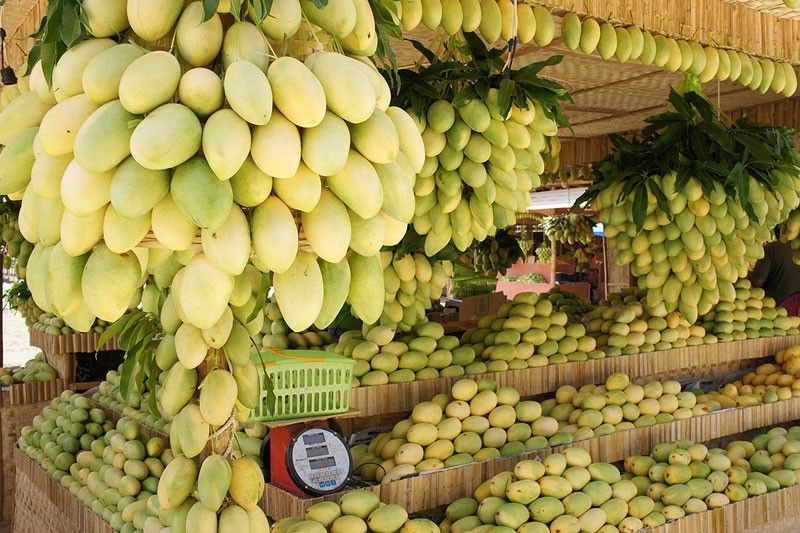‘Sweetest’ Guimaras mango becomes first geographical indication in Philippines

MANILA, Philippines — The application of the Guimaras mango to be registered as a geographical indication has been approved by the Intellectual Property Office of the Philippines (IPOPHL), making it the country’s first registered GI.
In a statement, the IPOPHL said it approved the Guimaras Mango Growers and Producers Development Cooperative (GMGPDC)’s application on May 13.
GMGPDC’s application, which it submitted in November 2022, passed the Bureau of Trademarks (BOT)’s thorough examination process.
“During the month-long publication period that followed to allow for third-party protests, the association also did not face any concerns of possible damage to an existing trademark,” IPOPHL said.
According to the IPOPHL, a GI serves as a marketing tool that accentuates a product’s distinctiveness and appealing narratives.
It said that a GI seal certifies a link between the quality, characteristics and reputation of a product and its geographical source. These factors may have been shaped by environmental influences, such as soil and climate, or human factors, such as tradition and local know-how.
Guimaras mangoes are produced across the entire island province of Guimaras, which is comprised of five municipalities – Jordan, Buenavista, San Lorenzo, Sibunag and Nueva Valencia.
In its manual of specifications (MOP) for Guimaras mango – a primary requirement to its registration as a collective mark in 2017 and even today as a GI – the GMGPDC described the fruit as a typical “carabao” mango variety.
“It is shaped like an ellipsoid with a rounded crown and an oblong end that features a distinct broad shoulder and full cheek weighing an average of 160 grams or more. Its flesh is meaty, smooth, firm, juicy and non-fibrous. It is also thin-seeded, making over 80 percent of the fruit edible,” IPOPHL said.
It said the tagline “the sweetest mango,” is also proven by the Total Soluble Solids (TSS) test conducted by the Bureau of Plant and Industry – Guimaras National Crop Research, Development and Production Support Center.
IPOPHL said the TSS is measured by Brix or the grams of soluble solids – mainly sugar compounds – per 100 grams of solution. Guimaras mangoes yield a sweetness of at least 16° Brix, which is considered above average.
It emphasized that these qualities are attributed to the province’s calcareous soil, which is abundant in calcium and magnesium and ensures proper drainage.
The MOP also laid out several practices relating to soil management and other pre-planting preparations up to post-harvest handling, packing and storage. It also detailed the rules and standards on product labeling, control and traceability which association members should adhere to maintain use of the GI seal.
With the approval of its GI registration, GMGPDC president Felipe Gamarcha expressed hope that the local prices of the Guimaras mangoes will double to give additional income to farmers.
Gamaracha was referring to the farm gate price of Guimaras mangoes which averaged P200 in 2022. This is already higher than the P20 to P50 that one kilo would usually fetch before the association secured a collective mark in 2017.
While it may have taken the association less than a year to secure protection, the first steps toward GI trace back to 2013 when it first worked with the European Union under the trade-related technical assistance project and consulted with IPOPHL.
Meanwhile, recognizing the challenges posed by counterfeiting, BOT director Jesus Antonio Ros acknowledged the importance of establishing a strong GI regime through a sui generis law. Such legislation would provide GIs with the necessary protection that conventional IP systems may not offer.
“In our proposed legislation, we make violation of GI a crime against the economic and cultural interests of the State, which means it can be enforced by the latter without private stakeholders initiating the process,” Ros said.
“Hopefully, our legislators will support our initiative,” Ros added.
The envisioned bill will also be in line with IPOPHL’s plans to bring the Philippines to accede to the 2015 Geneva Act of the Lisbon Agreement. The Geneva Act provides a streamlined international registration route for GIs, facilitating potential market expansion in over 70 contracting member countries.
“The pursuit of this international registration framework highlights the Philippines’ commitment to protecting its unique products and promoting them on a global scale,” IPOPHL director general Rowel Barba said.
Under the Geneva Act, GIs also enjoy an indefinite duration of protection as long as the main geographically attributed qualities are preserved. Hence, unlike with the collective and certification mark systems, which require renewal after 10 years, GIs registered under the Geneva Act won’t need renewal, saving on both time and costs.
To date, about 1,130 GIs are registered under the Geneva Act. IPOPHL has identified over 30 potential GIs which are being assisted for domestic registration, and later international protection once the Philippines accedes to the Act.
“Registration is just the beginning. IPOPHL will continue to work with the agencies, the local government, and the communities. We hope to ensure the farmers, producers and distributors reap the most rewards from their premium goods and cultural products,” Barba said.
- Latest
- Trending


























